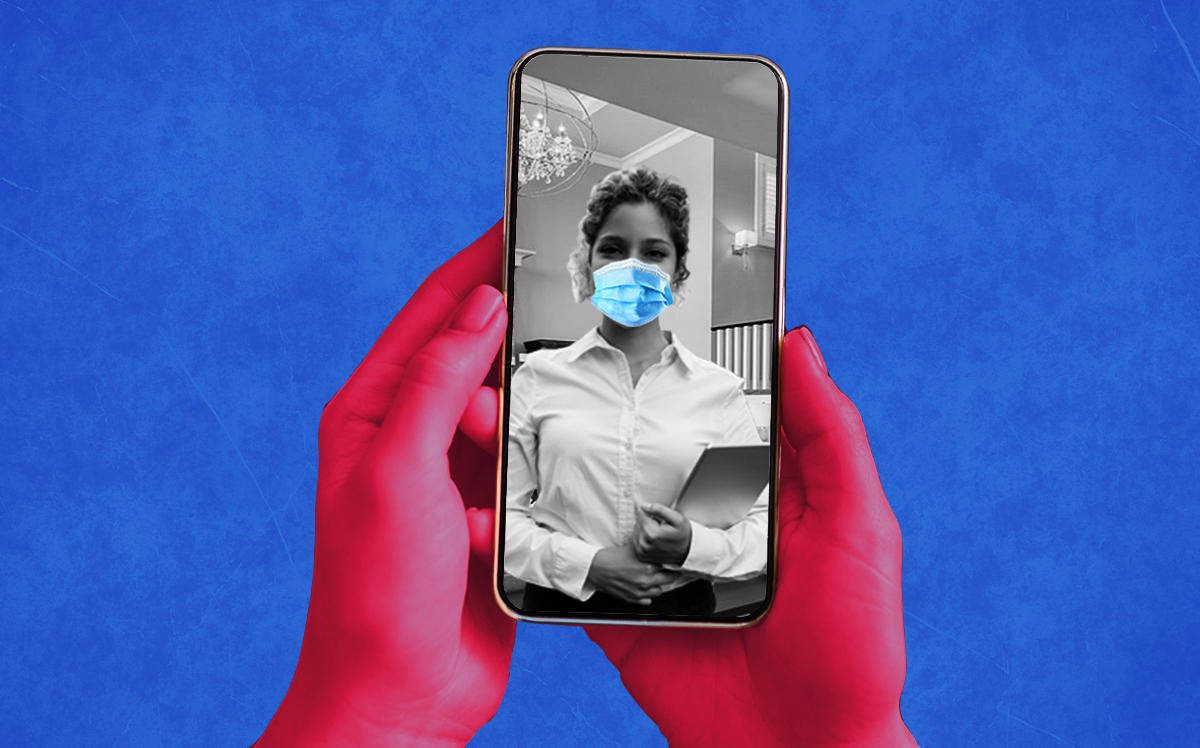 Cuomo orders real estate agents to stop showing homes
Cuomo orders real estate agents to stop showing homes
Trending
Trial by fire: Virtual showings put to the test
Though few and far between, sales and rentals are happening without in-person showings

Craig Dancewicz has experienced a lot of firsts in the past few weeks.
“I never thought that I’d be doing virtual tours from my childhood bedroom in Massachusetts,” he joked before showing off the 46-unit condo he’s handling — in Astoria, Queens — as part of Halstead Development Marketing’s sales team.
Dancewicz admitted he’s not much of a techie, but six weeks into New York’s ban on in-person showings, he’s feeling confident in troubleshooting issues with whatever video-call platform he’s using that day.
“Unfortunately, it’s not always going to be seamless,” he said. “[But] these virtual tours are a good option and people are ready for them.”
Read more
 Cuomo orders real estate agents to stop showing homes
Cuomo orders real estate agents to stop showing homes
 This weekend’s open house? You’ll have to tune in via livestream
This weekend’s open house? You’ll have to tune in via livestream
 Compass to agents: It’s (virtual) show time!
Compass to agents: It’s (virtual) show time!
But are regular New Yorkers actually forking over piles of cash to rent let alone buy an apartment they have never visited? Though such deals remain rare, they are happening, and, what’s more, many brokerage leaders and agents believe virtual tours will become a permanent fixture in the industry.
“I don’t think it will ever be the same,” said Brooke Baker, co-founder of rental firm, Urbane Brokerage.
Her firm has completed six rental deals where the tenant never set foot in the apartment until the lease was signed. Rents ranged from $3,000 to $5,000.
Though most of those clients are doctors and first responders moving to Manhattan to treat Covid-19 patients, Baker expects the practice to continue.
“People are thinking twice about coming into contact with people now,” she said. She thinks the pandemic’s ban on showings has inadvertently served as an “eye opener” to her and her clients that “it’s possible to do this without schlepping over to 50 apartments.”
Though showing real estate was deemed an essential service in early April, the state soon clarified that it could only be done with one person in the property.
In practice, that means one of three things: a regular video of a property shot by an agent; a 3-D video typically recorded with a special camera; or a live tour where an agent (or a resident) is walking through a home on a video call.
On the sales side, deals take more time, but some buyers are still going into contract without visiting what in many cases will become their primary home.
David Avgi, an agent at Bold New York, has had two clients sign contracts for properties sight-unseen in Greenpoint, Brooklyn.
In one of those cases, a couple inked a contract for a new development condo at 172 India Street for $625,000 based on a video Bold had filmed there.
They had been looking for a new home for a while and “realized they could get a deal done with more incentives,” according to Avgi. In their case, the sponsor was willing to pay the mansion and transfer taxes, give a $2,000 credit for a washer and dryer, and knock $35,000 off the last asking price.
Avgi had another buyer ink a $2.14 million contract in an off-market deal at 148 West Street after he showed them a similar video. He said the buyer ultimately got a $260,000 discount off the unit’s release price, transfer taxes paid by the sponsor and a $10,000 credit to renovate the kitchen.
Some developers are willing to go even further. At the Astoria condo Dancewicz represents, developer RockFarmer Properties is offering buyers who sign a contract during the shutdown the ability to walk away from the deal with a full refund of their deposit after they see the unit.
Buyers will have a five-day window whenever its sales gallery reopens to come in-person.
“It’s a no-lose situation,” said John Petras of RockFarmer. The condo, dubbed The Rowan, launched sales only six weeks before the pandemic shuttered its sales office.
Jordan Sachs, CEO of Bold, said his firm will never again list a property without having a virtual tour in addition to traditional marketing materials, such as photos and a floor plan.
Warburg Realty’s Clelia Peters agreed, to a point.
“I still strongly believe that people will not buy homes they have not seen,” she said. “But I can also imagine us in a scenario where [virtual tours, open houses and 3-D tours] are included in a listing.”
It remains to be seen what method, technology provider or quality standards will stick.
Zillow Group rolled out a free app for agents to create 3-D tours using a phone camera in late March. Compass also rolled out a set of virtual tools for its agents, including a platform to make 3-D video tours.
There are companies dedicated to producing virtual 3-D tours, such as Matterport, a California-based firm that has raised more than $155 million in venture funding.
Baker’s Urbane Brokerage uses Matterport. Baker said her firm invested under $10,000 in the camera and other expenses associated with the 3-D rollout. Cameras required to produce a Matterport 3-D tour cost between $400 to $18,500, though on May 4 the company launched an app compatible with smartphone cameras.
Warburg opted to recommend its agents use Asteroom, which produces a comparable product to Matterport’s tours but at less cost because it doesn’t require a special camera — the platform can work with an agent’s smartphone camera. Asteroom’s starter hardware kit costs about $90.
Founder Eric Tsai said the firm sold out of its hardware kits after Covid-related shutdowns began in March. Other brokerages around the country using Asteroom include Corcoran Global Living in San Francisco, Seven Gables Real Estate in Los Angeles and Texas’ JP & Associates Realtors.
Global Living CEO Michael Mahon said the firm expects to invest $200,000 this year to enable its 460 agents to produce virtual tours for all listings.
“Digital marketing is going to become a filter of the future to make sure you’ve got real interest in the properties,” said Mahon.
Brendan Wallace, managing partner and co-founder of Fifth Wall Ventures, agreed that the pandemic will fuel adoption of pre-existing technology, though he sees some unintended consequences. He believes the rise of virtual tours will strengthen the case for iBuyers. (Fifth Wall is an investor in iBuyer Opendoor.)
“If you’re going to be buying a home virtually, you want to have trust in who you’re buying it from,” he told The Real Deal.
In the name of trust, some brokerages are opting for familiar household apps to shoot virtual tours.
Brown Harris Stevens launched a guide for agents to give to sellers who still live in the property they’re trying to sell. It suggests using FaceTime or Zoom to host virtual tours or create assets for the agent to edit together later.
Pablo Marvel, head of marketing for the brokerage, said he sees a pared-down approach as being more appropriate for this period of uncertainty and isolation.
“The standard for authenticity and a genuine voice has never been higher,” he said. “People are turning away from this overly polished, sales-y voice.”
He said BHS took great care to emphasize that “the final product doesn’t have to be perfect.”
Raphael Sitruk, an agent at Keller Williams NYC, is using FaceTime and Zoom to show listings at Tessler Development’s 69-unit condo at 172 Madison Avenue among other properties.
He’s finding that his virtual open houses attract more people than his standard ones did and are easier to arrange than in-person meetings — though he noted a major contributing factor at 172 Madison is that he and his family live in the building. He also said virtual tours seem to be more efficient for everyone involved.
“It’s straight to the point,” he said. “If the buyer doesn’t like it, ‘Thanks very much.’”
Sitruk admitted that he was initially skeptical, but now says he’ll continue doing virtual tours, particularly for foreign buyers.
In Astoria, Halstead’s Dancewicz has also been finding success with foreigners. He has had one overseas client make an offer without even having been to the neighborhood, let alone the property.
The agent said he has also given virtual tours to buyers’ brokers by the dozens, and one scheduled showing is slated to have nearly 100 agents on the call. He doesn’t doubt the practice is here to stay.
“I think it will only evolve and get better and better,” said Dancewicz. “It’s really an onion that we’re peeling away right now.”
Write to Erin Hudson at ekh@therealdeal.com
Correction: In a previous version of this article, broker David Avgi’s name was misspelled. Context was later added around Raphael Sitruk’s quotes to clarify that he is conducting tours at multiple properties.




